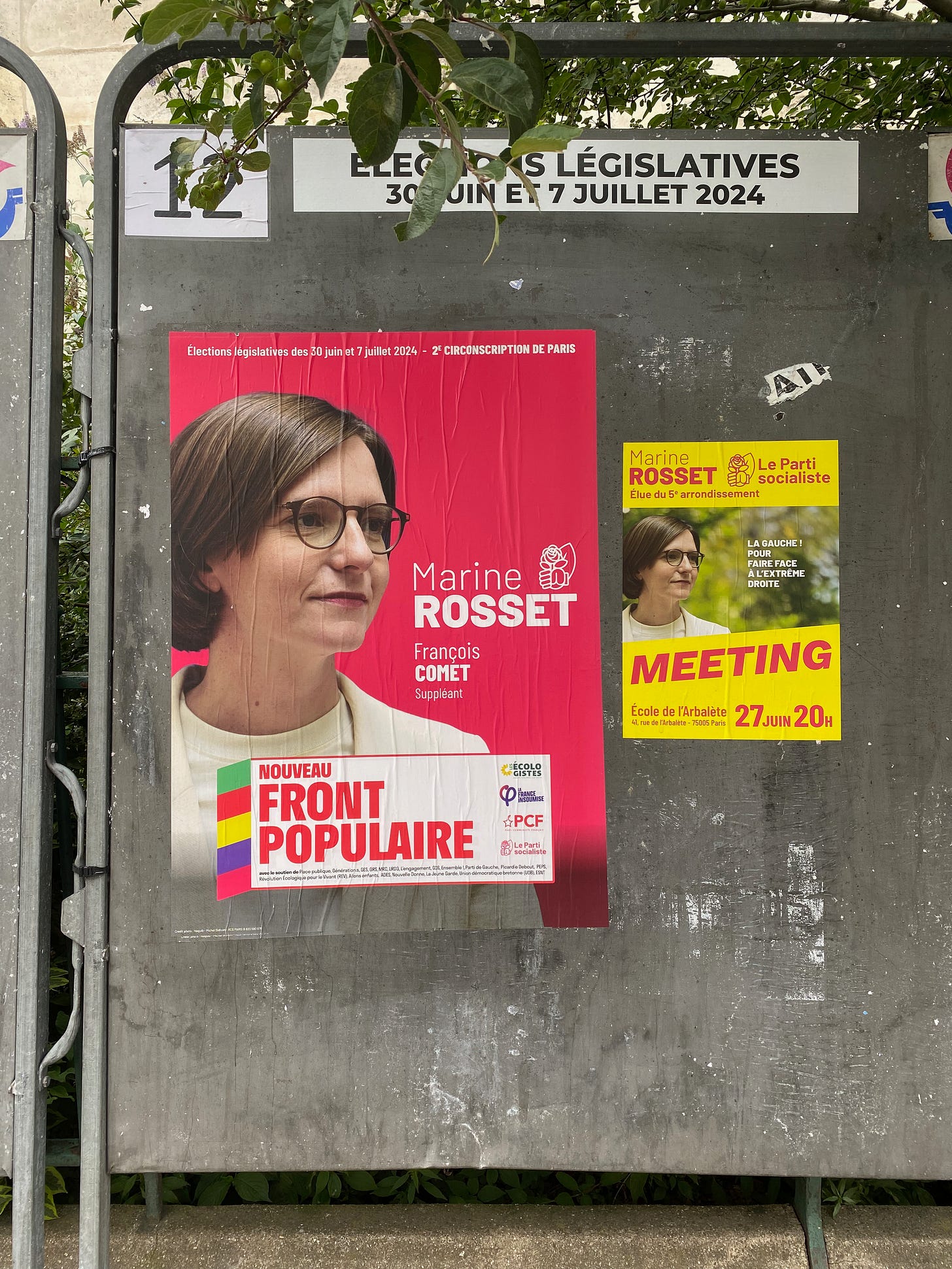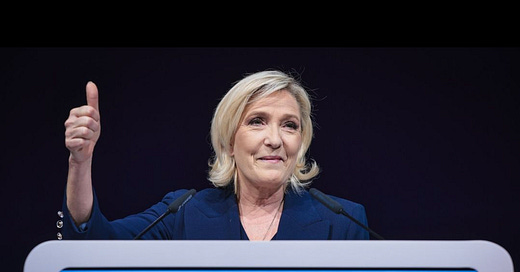Aux urnes, citoyens!
The first round of France's legislative elections confirmed the far right's strength.
Salutations depuis Paris ! I’m visiting the French capital for a couple of weeks and was lucky to witness the first round of the legislative elections yesterday. (I’m writing this letter from the Bibliothèque Sainte-Geneviève in the shadow of the Panthéon, which is open to anyone over 18 years old.)
After crossing the Seine from Île de la Cité to the Left Bank yesterday afternoon, I passed by a series of electoral posters featuring the candidates vying for the National Assembly seat from Paris’s 2nd constituency. The four major parties or coalitions were all represented — the leftist Nouveau Front Populaire (NFP), centrist Ensemble (led by President Emmanuel Macron’s Renaissance party), conservative Les Républicains (LR), and far-right Rassemblement National (RN).
The posters revealed many of the challenges and tensions that the four main blocs faced during the whirlwind campaign. The poster for the NFP candidate, the socialist Marine Rosset, featured her headshot and the logos of the NFP and its four principal constituent parties. Noticeably absent was any mention or image of a party or coalition leader — emblematic of the NFP’s failure to choose one clear figurehead for voters to rally behind, particularly in light of tensions between the leftwing La France Insoumise (LFI) and the center-left Socialist Party.

On the Ensemble poster, the candidate Jean Laussucq was flanked by Prime Minister Gabriel Attal (who is leading the Ensemble campaign) and Culture Minister Rachida Dati (who is also the mayor of the 7th arrondissement of Paris). The poster contained no trace of Macron, whom Ensemble candidates have taken pains to minimize during the campaign — though it was he who initiated it by dissolving the National Assembly three weeks earlier.

The LR poster was accompanied by a note that the candidate was “supported by François Baroin and François-Xavier Bellamy,” the latter being the party’s leader in last month’s European elections and one of the interim executives during LR’s legal battle with party president Éric Ciotti. The note was no doubt added to clarify for voters that the candidate, Félicité Herzog de Cossé Brissac, wanted nothing to do with Ciotti’s alliance with the far right.

Finally, the RN poster contained only a small mention of the candidate running in the constituency (Mélody de Witte), prioritizing instead the images of Marine Le Pen and party president Jordan Bardella, with “Bardella Prime Minister” in bold capitals — thus “presidentializing” the stakes of the race. The poster had been defaced (to such an extent that I’m not comfortable sharing a photo of it with you), including words like “FACHO” (short for fascist), “Vote NFP,” and Chinese characters that I’m told mean “evil.” The RN didn’t stand a chance in Paris, which Libération has called the “capital of the Nouveau Front Populaire.”
After the posters, I came upon a polling place at an elementary school, with a line of eager (and probably apprehensive) voters stretching along the sidewalk. Voter turnout was particularly high for a legislative election — 66.7% according to the interior ministry, significantly more than the first round of the 2022 legislative election (47.5%) or last month’s European election (51.5%), and within striking distance of the 2022 presidential election (73.7%). Voters understood the importance of this election, and their heightened participation means that the results are an even better indicator of the national mood than the European election, which the RN dominated.
Gabriel Attal: “The far right is at the gates of power”
When the last polls closed and the first estimates of the results rolled in at 8 p.m., it was still light outside — the sun wouldn’t set for another two hours. In the 10th arrondissement where I was having dinner, Parisians were sitting on restaurant patios at their leisure. It could have been any other summer Sunday evening in the capital, except for the fact that many diners were discussing the anxiety-inducing state of French politics.
As with the European election, opinion polling leading up to Sunday’s vote proved remarkably accurate. The RN (along with its LR allies endorsed by Éric Ciotti) came in first with 33.2% of the vote, followed by the NFP (28%), Macron’s Ensemble (20%) and LR plus “miscellaneous right” (10.2%).
Although the RN’s score is only 5 percentage points higher than the NFP’s, the first-round result raised the country’s blood pressure. As the leading party, the RN could claim a symbolic victory even before next Sunday’s runoff. In her victory speech from her fief of Hénin-Beaumont in northern France, Marine Le Pen noted that “such high participation gives particular strength to the vote” and called on the French people to accord Jordan Bardella an “absolute majority” in the Assembly. She also claimed that the Macronist bloc had been “practically erased.”
The RN’s score was also a big improvement from its performance in the first round of the 2022 legislative election (18.7%). By adding to its score in last month’s European election (31.5%), the RN’s voters not only confirmed the party’s rapid trajectory from the fringe to the fore of French politics — they proved wrong Macron’s bet that the European result was merely a protest, and that they would choose differently with a central institution of the Fifth Republic at play. Delivering a five-minute address from the hôtel de Matignon, Attal said solemnly, “Tonight’s lesson is that the far right is at the gates of power.”
One more week to save the Republic?
As I discussed last week, France’s two-round, winner-takes-all electoral system for the National Assembly magnifies the strength of the dominant blocs in the allocation of seats. Thus, although the RN earned just one-third of first-round votes, it will likely win around half (or just under half) of seats in the runoff next Sunday. According to one projection by IFOP for Le Figaro, the RN could obtain between 240 and 270 seats, which would put it below the threshold of 289 seats needed for a majority. If the RN is unable to achieve an absolute majority, it’s still possible that Bardella will be kept away from the premiership.
Before next Sunday’s runoff, the parties of the “republican front” are working hard to block the far right’s path to power. To heighten pressure on the RN, the NFP has called on its candidates who arrived in third to stand down in constituencies where the RN is leading. Ensemble has taken a more ambiguous approach, calling for a similar désistement of its third-place candidates unless certain LFI candidates are leading — which would be consistent with Ensemble’s attempt to position LFI and the RN back-to-back as contrary to republican values. LR has refused to give voters advice for the second round, with François-Xavier Bellamy claiming that “the danger facing our country today is the extreme left.”
The fever pitch of the left’s calls to block the far right — with an editorial from Libération’s Dov Alfon emphasizing that the country has “one week to avoid the worst” — is muddled, then, by the ambiguity of the center and right. While the precise composition of the Assembly remains unsure, there is a sense that the tide has turned from the center and is now rushing toward the far right. Marine Le Pen’s lectern on Sunday night read “L’alternance commence” — the alternation is beginning.

P.S. The title of this letter, which means “To the polls, citizens!” is a play on a line from la Marseillaise (France’s national anthem), “Aux armes, citoyens !” (To arms, citizens!).
Thanks for reading! What do you think about Sunday’s results? Is the far right on the verge of taking control of the National Assembly? Let me know in the comments! For the full picture of France’s shifting political landscape, check out last week’s post.
Is Macronism dead?
“Will there be a re-election at the European level?” This question, posed by a resident of Gennevilliers, a communist bastion in the northern Paris suburbs, captured the disarray triggered by President Emmanuel Macron’s shocking decision to dissolve the National Assembly






What an election! Thanks for your reporting from the "field," i.e., Paris! Your writing transmits to the reader the energy and the angst among the French people, as well as the gravity of the moment and the high stakes for the French Republic. Keep us posted.